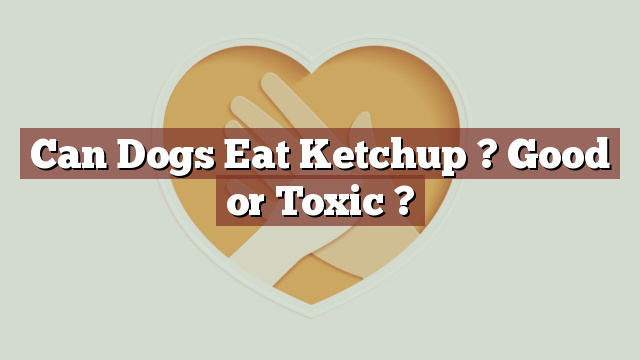Can Dogs Eat Ketchup? Good or Toxic?
As pet owners, it is crucial for us to be aware of what foods are safe for our furry companions. While some human foods can be shared with dogs, it is important to understand which ones can be harmful to their health. One food that often raises questions is ketchup. In this article, we will explore whether dogs can safely consume ketchup and the potential risks or benefits associated with it.
Nutritional Value of Ketchup: Understanding its Contents
Ketchup, a popular condiment, is made from tomatoes, vinegar, sugar, and various seasonings. It is typically low in fat and calories. Additionally, it contains small amounts of vitamins A, C, and K, as well as minerals like potassium and lycopene. However, it is important to note that these nutritional benefits are derived from the tomatoes used to make ketchup, rather than the ketchup itself.
Can Dogs Eat Ketchup? Ensuring Your Pet’s Safety
No, dogs should not consume ketchup. While ketchup itself may not be toxic to dogs, it is not a necessary or beneficial addition to their diet. The primary concern lies in the ingredients used to make ketchup. Ketchup often contains high levels of sodium and sugar, which can be detrimental to a dog’s health if consumed regularly or in large quantities.
Additionally, some ketchup brands may include onions or garlic, which are toxic to dogs. These ingredients can cause damage to their red blood cells and lead to anemia. It is crucial to check the label carefully before considering feeding ketchup to your dog.
Potential Risks or Benefits: What Ketchup Might Pose to Dogs
Feeding ketchup to dogs can potentially lead to several health risks. The high sodium content in ketchup can contribute to elevated blood pressure and strain on the kidneys. Excessive sugar intake can also lead to obesity, dental issues, and even diabetes in dogs.
On the other hand, the small amounts of vitamins and minerals found in ketchup are not significant enough to provide any noteworthy health benefits to dogs. These nutrients can be obtained from other, healthier sources that are specifically formulated for canine consumption.
My Dog Ate Ketchup! Steps to Take and Possible Concerns
If your dog accidentally consumes a small amount of ketchup, there is typically no reason to panic. However, it is important to monitor your dog for any signs of digestive upset such as vomiting, diarrhea, or loss of appetite. If your dog has ingested a large amount of ketchup or shows concerning symptoms, it is advisable to contact your veterinarian for guidance.
Conclusion: Moderation is Key when Feeding Ketchup to Dogs
In conclusion, it is best to avoid feeding ketchup to dogs. While it may not be toxic in small amounts, the high sodium and sugar content, along with potential harmful ingredients like onions and garlic, make it an unsuitable choice for regular consumption. As responsible pet owners, we should prioritize their health and well-being by providing them with a balanced and appropriate diet specifically designed for dogs. If you have any doubts or concerns about your dog’s diet, always consult with a veterinarian for professional advice.
Thank you for investing your time in exploring [page_title] on Can-Eat.org. Our goal is to provide readers like you with thorough and reliable information about various dietary topics. Each article, including [page_title], stems from diligent research and a passion for understanding the nuances of our food choices. We believe that knowledge is a vital step towards making informed and healthy decisions. However, while "[page_title]" sheds light on its specific topic, it's crucial to remember that everyone's body reacts differently to foods and dietary changes. What might be beneficial for one person could have different effects on another. Before you consider integrating suggestions or insights from "[page_title]" into your diet, it's always wise to consult with a nutritionist or healthcare professional. Their specialized knowledge ensures that you're making choices best suited to your individual health needs. As you navigate [page_title], be mindful of potential allergies, intolerances, or unique dietary requirements you may have. No singular article can capture the vast diversity of human health, and individualized guidance is invaluable. The content provided in [page_title] serves as a general guide. It is not, by any means, a substitute for personalized medical or nutritional advice. Your health should always be the top priority, and professional guidance is the best path forward. In your journey towards a balanced and nutritious lifestyle, we hope that [page_title] serves as a helpful stepping stone. Remember, informed decisions lead to healthier outcomes. Thank you for trusting Can-Eat.org. Continue exploring, learning, and prioritizing your health. Cheers to a well-informed and healthier future!

